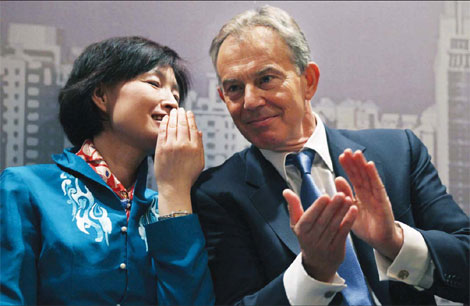Green mission
Updated: 2011-04-01 10:45
By Li Xing(China Daily European Weekly)
|
|||||||||||
Tony Blair believes China will take a leading role to fight climate change and cut emissions
Former British prime minister Tony Blair divides his time over several vocations - diplomacy, charity and initiatives to combat climate change. A globe trotter, he has made China one of his frequent destinations, 17 trips since he left office.
 |
|
Wu Changhua, the Greater China director of Climate Group, and former |
As envoy of the Quartet (the United Nations, the United States, the European Union and Russia), he met China's Middle East envoy Wu Sike in August, 2009, when Wu just took over the job.
Through his Sports Foundation, Blair promotes sports among all children. He talked about "what makes a champion" at Peking University five days before the 2008 Beijing Olympics opened.
With his Faith Foundation's Faith and Globalization initiative, he tries to "encourage people of faith to work together more closely to tackle global poverty and conflict," as stipulated in the foundation's mission statement. Peking University is a partner with the initiative.
However, promoting programs for low-carbon development remains his top agenda in China.
"He has become more confident in China taking a leading role in climate actions through his discussions with Chinese leaders, local government officials, businesses and media," Wu Changhua, the Greater China director of the Climate Group, says.
During his visit late last month in Beijing, Blair, along with several other climate action leaders, produced a loud bang with a big mallet to start a partnership between the Climate Group - an international climate action organization - and five Chinese cities that aims to help cities build green capacity, develop best practices and implement new plans for low-carbon development.
"As a nation, China has the opportunity to lead the world in the low carbon economy, but China's cities are where the foundations for green growth will be laid," he says in his keynote speech at the launch of the partnership program called "China Redesign".
Although the program works with local governments and businesses, it is projected to contribute to China's efforts in meeting targets set in its 12th Five-Year Plan (2011-2015) to improve energy efficiency and reduce the intensity of carbon emissions per unit of GDP.
"China's Five-Year Plan is very ambitious, there are cuts in energy intensity and cuts in emission intensity. China also aims to get 15 percent of its energy from non-fossil fuels by 2020. This is a big big change," Blair says.
The task at hand is challenging.
"The biggest challenge (to meet the targets) is China's growth and its industrialization is on a scale that the world has never seen before," he says.
"China is changing in all sorts of way, economically, but also socially, culturally; politically, I think it is also evolving," he says. "People want a green future, but a future with growth, jobs, a better life, prosperity.
"We are asking China to develop in a sustainable way when countries like mine developed without regard to the environment," he says. "So this is why there is a great responsibility and obligation to understand why this is such a big challenge (for China) and why it is so important that we help in that."
Before this trip for "China Redesign", Blair came to China to help initiate other similar programs. Two years ago, along with the kungfu film actor Jet Li, he visited a village of Miao ethnic group in the rural suburbs of Guiyang, capital of Southwest China's Guizhou province.
They were at the village chosen as a pilot site for a five-year joint initiative between the Climate Group and the Jet Li One Foundation to install solar LED lights in 1,000 villages in China, India and African countries between 2009 and 2013.
The program introduces an alternative but low-carbon source of lights for remote villages with difficulties in getting connected to the power grid while improving the quality of living for local residents.
"There is a credible, practical, realistic as well as radical way to act. We can set the world on a new path to a low-carbon future. But we need to start making these decisions now which is why I am delighted to be supporting this initiative with Jet Li today," Blair was quoted as saying at the ceremony.
Last July, he attended an Eco-Forum in Guiyang during which he talked at length on global actions to slow down the climate change.
"By mid-century, we need to cut emissions by two-thirds and the carbon intensity of the world economy by 90 percent to avoid dangerous global warming," he announced.
Last August, he was in China again, marking the first anniversary of a consumer engagement campaign called "Million Forest", which allows individuals to reduce their carbon footprint by helping plant a million trees in northwestern China. In one year's time, the program raised 500,000 yuan (54,000 euros) for 2,500 rural families to plant 100,000 trees.
Last November, Blair was in Beijing again to officiate at the launch of a corporate low-carbon action plan with the goal to help companies develop suitable low-carbon strategies.
"Enterprises are the backbone in low carbon development. They play vanguard roles in technological innovation and low carbon practices, to reduce the effect that business activities bring to the environment and climate," Blair was quoted as saying.
On almost all occasions, Blair repeatedly emphasized the importance of technology in providing solutions for low-carbon development.
"China's industrialization is going to happen, if it is to happen sustainably, we need new technologies," he says.
"It is important for us to try make sure we create the mechanisms and platforms for developing new technology and deploy them. I also think the Western countries - some of them - understand we cannot hold these technologies, it is not very sensible," he says.
"It is important that we build pressure for the sharing of the technologies," Blair says.